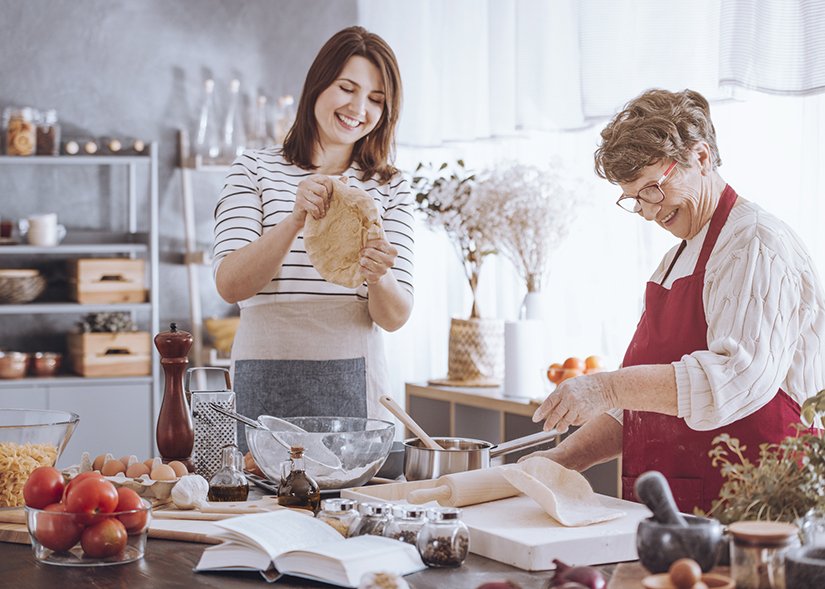
<!DOCTYPE html PUBLIC "-//W3C//DTD HTML 4.0 Transitional//EN" "http://www.w3.org/TR/REC-html40/loose.dtd“>
By Barbara Glass
Creating enchanting family holiday celebrations requires a special organizer who can connect with family members of all ages and personalities: siblings, distant relatives, children of various ages, as well as older parents and grandparents.
One of the most challenging aspects can be accommodating elderly family members, who may have physical or cognitive limitations. This necessitates thoughtful planning by adult children. Dr. Paul K. Chafetz, a clinical psychologist from Dallas and author of Loving Hard-to-Love Parents, advises, “Adjust your expectations based on who will be at the gathering. Offer compassion and forgiveness in the spirit of the season. The gift of compassion is a gift to all.” Here are some strategies to show compassion to elder relatives:
Plan Ahead
The family organizer should start planning well in advance of the holiday gathering. It is essential to enlist assistance from other family members for tasks such as food preparation, grocery shopping, transportation, and organizing group activities. If the older adult faces memory issues, the Alzheimer’s Association suggests having other family members involved in caregiving. Additionally, it’s important for the host to ensure they get enough rest to enjoy the celebration themselves.
Include Elders in the Planning Process
Engage elder parents in preparations, such as wrapping gifts, decorating, making cards, cooking special recipes, or recreating a cherished holiday tradition from their childhood. Finding ways to involve older family members in helping the host can enhance the special nature of the celebration for everyone. If a large family gathering is expected, be sure to ask others to contribute potluck dishes and help with arrangements prior to the event.
Address Physical Challenges
Plan activities that cater to physical limitations: light displays, special performances, faith-based events, and holiday movie matinees are typically accessible and considerate of an older adult’s energy levels. Even the most active seniors may have limits. Be ready to shorten shopping trips; if an elder seems fatigued, suggest a break at a café for tea. Never overschedule their time to avoid exhausting them.
Consider Health Concerns
Be aware of any medication and rest schedules of elderly family members, and try to plan events around these. According to Harvard Medical School, older adults may be more susceptible to stress, which can arise from disruptions to their routine. Thoughtful scheduling and opportunities for relaxation can help alleviate stress.
Food and Beverages
Pay close attention to dietary needs. Elderly individuals often eat less and may forget to stay hydrated, which can affect their energy and mood. It’s a good idea to serve non-alcoholic beverages for both older adults and children at the gathering, along with small, healthy snack options.
Family Touchpoints
Every family has its complexities, but during gatherings, members should set aside their differences and be ready to overlook any random comments that may arise. As Dr. Paul Chafetz notes, “Elders will come with their unique personalities, and some thoughtless remarks might occur.” Holiday gatherings should focus on celebrating the connections within the family. The organizer should emphasize these shared connections and foster an atmosphere of forgiveness for any differences.
Keep It Simple and Familiar
What is the “secret sauce” for hosting elderly family members? For intergenerational gatherings, keep things straightforward and in familiar environments. Use familiar aromas and gentle music to set the mood. Arrange seating for easy access for elders and keep the gathering space less crowded. The Alzheimer’s Association suggests that minimal distractions benefit parents with cognitive issues. Dr. Chafetz recommends providing name tags to help elders identify who is who. Family time should be organized in manageable segments during the elder’s most alert times of day.
Family Tree
One engaging activity for seniors is storytelling. Holidays often inspire older family members to reflect on past experiences. Use a tape recorder or your cell phone camera to document these valuable moments. Dr. Chafetz proposes creating a “genogram” of family relations displayed on a large wall. This diagram, akin to a “family tree,” would illustrate generational relationships and could even include story prompts under each name. All that is needed is a large piece of paper, tape, and some colored markers to create the genogram. This type of connection through time is meaningful for both adults and children, and a holiday gathering is an ideal opportunity for this.
Holiday gatherings offer a wonderful chance to share beloved thoughts and express what truly matters. These moments provide gifts to elders as they share their stories, and to children as they listen and learn.
Conclude the event with a family photograph as a keepsake. Holidays are meant for creating memories. Enjoy!






